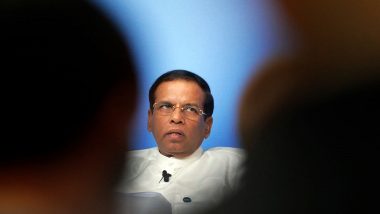The political crisis in Sri Lanka is set to get worse as another institution has become embroiled in the quagmire initiated by President Maithripala Sirisena. The country’s Supreme Court issued an interim order against the proclamation issued by President Sirisena which prematurely dissolved Sri Lanka's Parliament.
A three-Judge bench of the Supreme Court heard a challenge to Sirisena’s proclamation, which had first suspended the parliament and sacked prime minister Ranil Wickremshinghe on October 26. Sirisena had then sworn in Mahinda Rajapaksa as the new prime minister followed by an order on November 9 to dissolve the parliament after it became obvious that his alliance was finding it difficult to muster the required majority in Parliament to form the government.
The bench comprising of Chief Justice Nalin Perera, Justice Priyantha Jayawardena and Justice Prasanna Jayawardene heard the petitions filed by several political parties seeking the court’s order against the President's proclamation and granted leave to proceed with them.
After hearing the petition, the bench read out the crucial interim order to a packed courtroom that was being guarded by hundreds of armed police men and commandos. The interim order was a major blow to Sirisena as the three-judge bench ruled:
- President Maithripala Sirisena's decision to dissolve the island nation's parliament has been overturned.
- The court ordered a stay on the President's decision till December 19
- The judges also ordered a halt to preparations for snap elections scheduled for January 5 next year.
The order came despite the country’s attorney general siding with the President and telling the Supreme Court bench that Sirisena had exercised his plenary executive power to dissolve the parliament. The AG had also told the Supreme Court that they did not have a jurisdiction to hear the filed petitions against Sirisena’s orders.
The AG’s support of Sirisena adds more fuel to the political crisis as it gives the President room to possibly ignore the Supreme Court’s ruling. However, the attorney general is not the authority on the interpretation of Sirisena’s powers nor could he be called unbiased as he currently works for the Lankan President. But, what is for sure is that Sirisena’s decision to sack Ranil Wickremesinghe is illegal as under the 19th Amendment of Sri Lanka’s Constitution which was adopted in 2015, the president no longer has the power to remove the prime minister at his discretion. (With ANI inputs)
(The above story first appeared on LatestLY on Nov 14, 2018 03:46 AM IST. For more news and updates on politics, world, sports, entertainment and lifestyle, log on to our website latestly.com).













 Quickly
Quickly


